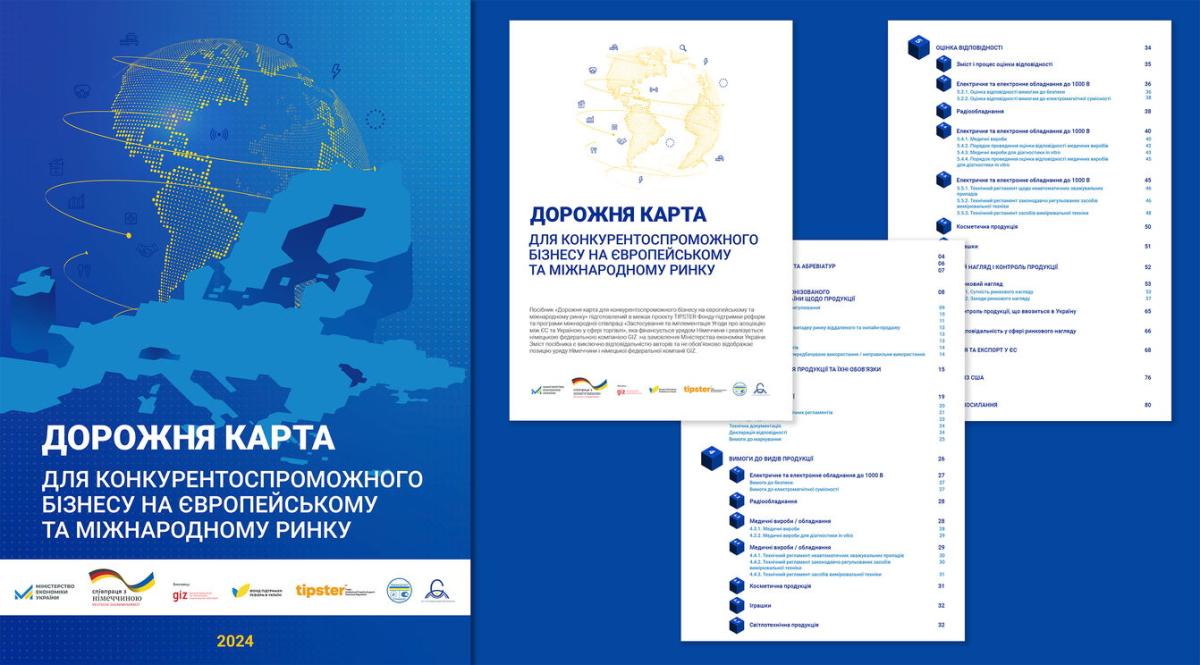 At the initiative of the Ministry of Economy of Ukraine, within the framework of the TIPSTER project of the Foundation for Support of Reforms in Ukraine and the international cooperation programme ‘Application and Implementation of the EU-Ukraine Association Agreement in the Field of Trade’, funded by the German government and implemented by the German federal company GIZ, as well as with the participation of state-owned enterprises Ukrmetrteststandard and Poltavastandardmetrologiya, a manual ‘Roadmap for Competitive Business in the European and International Market’ was developed.
At the initiative of the Ministry of Economy of Ukraine, within the framework of the TIPSTER project of the Foundation for Support of Reforms in Ukraine and the international cooperation programme ‘Application and Implementation of the EU-Ukraine Association Agreement in the Field of Trade’, funded by the German government and implemented by the German federal company GIZ, as well as with the participation of state-owned enterprises Ukrmetrteststandard and Poltavastandardmetrologiya, a manual ‘Roadmap for Competitive Business in the European and International Market’ was developed.
The manual aims to explain to business entities the main aspects of Ukrainian legislation in the field of industrial goods safety, technical regulation and market surveillance in a clear way, provide comments and explanations of key concepts and categories, and better understand how to apply the rather extensive and detailed legislation in these areas.
The roadmap explains, among other things, the scope, subject matter and scope of regulation, including concepts and procedures related to the provision and placing on the market, conformity assessment, basic product requirements, rights and obligations of business entities depending on their role in the supply chain, as well as market surveillance, product control and liability in this area.
In addition to horizontal issues, the guide provides an overview and references to the requirements for selected product types, including electrical and electronic equipment, medical devices/equipment, non-automatic weighing instruments, measuring instruments, cosmetic products, toys, and lighting products.
In addition, the issues of integration and exports to the EU and trade with the United States are covered to help business entities begin to familiarise themselves with the legal requirements of certain international markets for the purpose of exporting these types of products.
The European Union remains Ukraine's largest trading partner, and in order to enter the European market, domestic producers need support in preparing to operate under EU rules to increase compliance with industry-specific European standards, legislation and regulations.
The guide will be useful for manufacturers and businesses interested in producing and exporting domestic products to the EU market, as well as other stakeholders whose activities are related to overcoming technical barriers.
Read the manual
For reference:
Having acquired the status of a candidate for accession to the European Union on 23 June 2022, Ukraine must complete a comprehensive transformation of all areas of its activities, which will create conditions for the functioning of our country in accordance with the principles of the European Union and its laws aimed at protecting every citizen and business. Today, Ukraine is actively preparing to join the EU.
In particular, measures are being taken to prepare for bilateral meetings on the EU's official screening of the negotiating chapters, including Chapter 1, Free Movement of Goods.
Ukraine should create conditions for the production of competitive domestic products and ensure their competitiveness in the European and global markets by means of technical regulation instruments, overcome technical barriers to trade between Ukraine and the EU, and increase the volume of exports of Ukrainian goods to these markets as a result of the recognition of Ukraine's technical regulation system at the European and international levels.
Ukraine has come a long way in this direction: the relevant provisions of EU legislation have been transposed into the domestic legal framework; the necessary administrative and institutional reforms have been implemented; and an efficient and transparent administrative system has been put in place to implement Chapter 3 ‘Technical Barriers to Trade’ of the Association Agreement.
The adoption of horizontal and sectoral legislation of Ukraine harmonised with EU legislation, as well as its practical application in the field of quality infrastructure, made it possible to move into a practical plane the issue of preparing for the signing of the Agreement on Conformity Assessment and Acceptance of Industrial Products (ACAA) in the first three priority sectors of industrial products (low-voltage electrical equipment, electromagnetic compatibility of equipment, and machinery).

